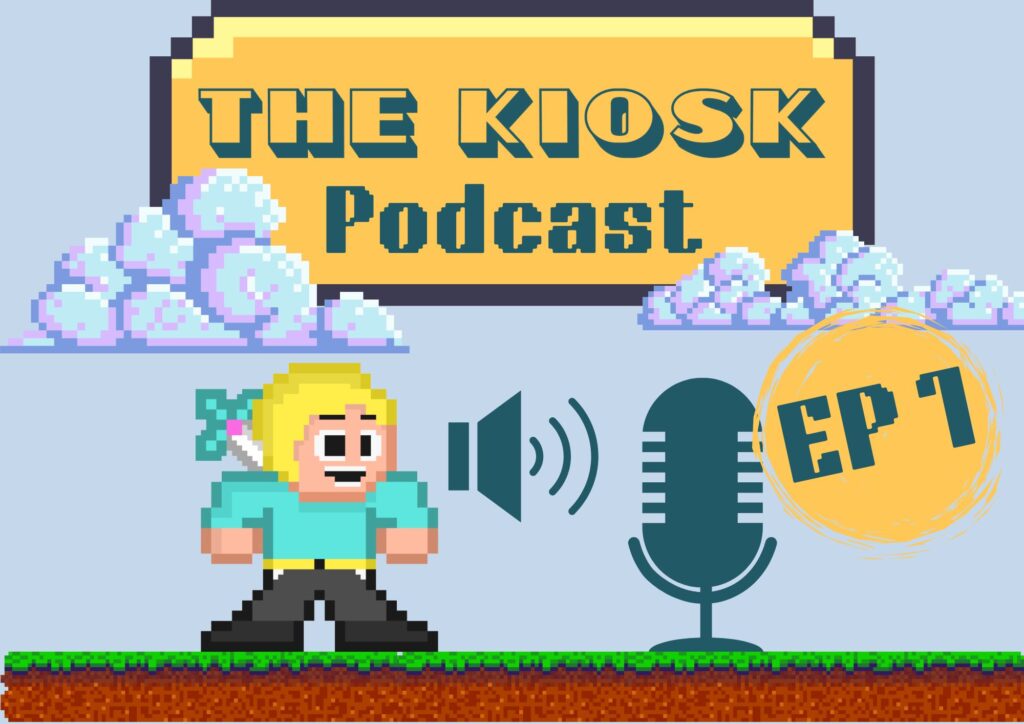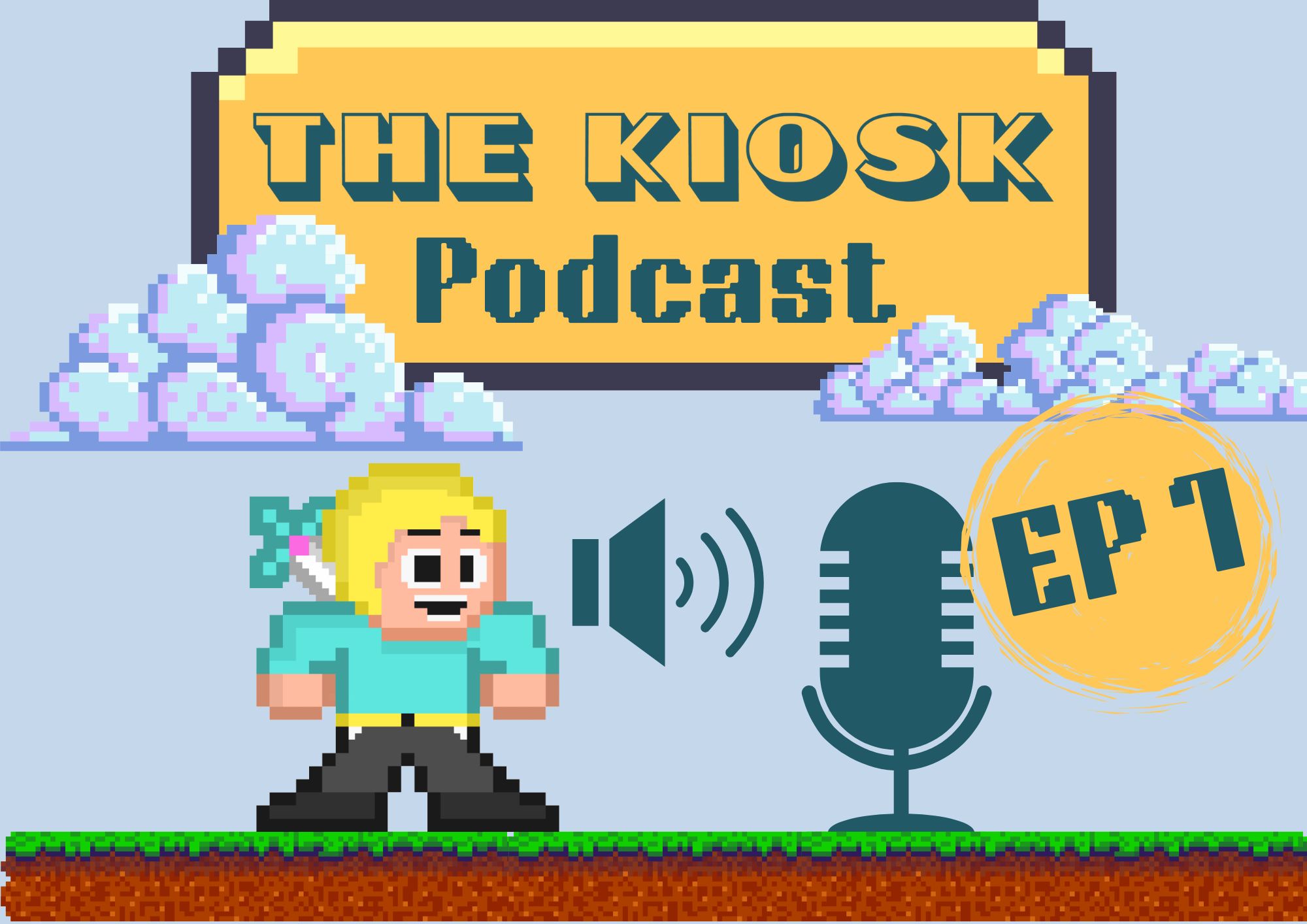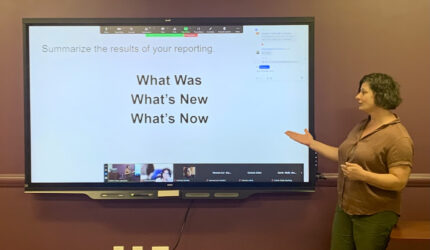
CUNY SPS student Ben Sperling initially found success in the entertainment industry, more specifically in voiceover acting. In a recent interview over Zoom, Sperling discussed his decision to finish his degree while remaining in his industry, how he got his start in voiceover work, and how the industry has changed since the pandemic. Listen to The Kiosk’s inaugural podcast episode (or read the transcript) below.
Transcript
The Kiosk: Tell us about yourself and why you chose CUNY SPS.
Ben Sperling: I am 35, I live in New York, I grew up on the Upper East Side. I went to Hunter College, that was my first time going to college, I guess back in 2008. I left school when I was 21 because voiceover started working out and took several years off. And I was happy, proud that I didn’t have a college degree and I was doing it on my own and finding some success in that. And then something just recently flipped in me where I was like, I wanna come back. And it wasn’t any one thing, and it wasn’t something where I had just thought about it and weighed it back and forth. It was overnight, something was just like, no, there’s no reason why I shouldn’t finish my degree, I had put this time in. It’s not like I had any immediate career change plans, like I love what I do. But I kind of wanted to give myself, not immediate options.
Voiceover is under pressure from a lot of things, like particularly AI, and a lot of the biggest agencies have folded in the last few years because the old business model is not really sustainable. I wanted, down the road, maybe there’s something else that I want to do. Not right away, but I don’t want to be locked in and I know the workplace is changing where college degrees are not required as much as they used to be. I thought this is something that I can accomplish. Why don’t I do it? There’s so many easy and more affordable ways and accessible ways, and CUNY SPS has kind of been perfect for me, tailor-made for what I needed.
The Kiosk: Talk about your experience from acting at age nine to Brooklyn Tech to leaving college.
Ben Sperling: I started doing improv comedy theater when I was a little kid. I started at summer camp and it was just kind of like an elective, an option that I chose, immediately fell in love with it. Then just kept doing that, brought that back to my real life outside of camp, kept doing that until I was…so my voice changed pretty early. I was like 11, 12 maybe, and I had this really noticeably deep voice. That kind of started thrusting these two things together because right away I was everybody’s parents on the phone for sleepovers, like calling other parents. So I was pretending to be everybody’s dad. That really worked for a while.
When I got to high school, when I went to Brooklyn Tech, I kind of knew I didn’t know what voiceover was by itself, but I knew that I loved being a performer. But I also played football. You know, I had a lot of sides to me. But when I was 15, that was my junior year. I had a teacher who asked me to come emcee and host a fashion show. And I didn’t know anything about fashion, but it was a chance to talk into a microphone and be on stage and combine these two things, my love for performing with using my voice to perform. Again, I was just like, this is incredible. This is it for me. I love this. And that kind of gave me the guidance to figure out what is voiceover, to really look into pursuing voiceover specifically.
Through the rest of high school, I was messing around with friends, recording stuff on laptops, technology was right about to be as successful as it is now. But it was still like, we were putting stuff together using, the first microphone I ever had was like $15. It was like a video game headset. And we would just do what we could and try to make fake commercials in college. I started doing radio. And so first I went to Hunter and then I went to Ramapo College in New Jersey. And a lot of stuff happened. My family had to pick up and move. So I went there and again, just really loved talk radio. My show got as successful as a college radio show can get, which is inherently not that successful. But we won a couple of awards. We had a lot of fun from there in college. I thought like, okay, maybe radio, but everybody in voiceover and people that I’m reaching out to, they’re like, don’t do radio. It’s a completely different art. Radio is dying. There’s no money in it. So towards the end of college, I learned, okay, commercial voiceover is something specific, separate from voiceover.
I made my first legit demo in college, started getting paid for voiceover and started getting audition opportunities in college. It’s a wild story, but this is the defining moment for me leaving school the first time. I had an audition that was going to pay, if I booked it, more than $7,000 for 25 minutes of work. And then the choice was either go to the audition or go to my German class. And I was just like, and this sounds rude and crass, but, I don’t think the adjunct professor was making for that entire class that semester, what I was being offered for this quick commercial voiceover job. And me at 21, thinking I knew everything was like, what is this professor going to teach me? It seemed like an obvious choice and so I went to the audition.
The Kiosk: What advice do you have for a career in commercial voiceover?
Ben Sperling: I think number one is do not expect it to start paying anytime soon. I got what I consider a six-year headstart from like 15 to 21 of having the chance to learn how to start, how to be a voiceover actor. And it made it look like I started booking right away. When I started going to auditions, I had six years of nobody paying me a dollar to learn the craft. So my advice is patience. Some people will work at this forever and never get paid for it. You have to love it so much that you’re just willing to be told no constantly. And you’re like, no, I’m not going to give up. I know people who have an entire full time career just to pursue voiceover. Make sure it’s something that you love, be patient, be realistic and research the industry.
It’s good to reach out to voice actors and ask them like, hey, what’s your advice, any tips? And my tip is, you’re going to have to learn it on your own because I’m happy to point you in the right direction until you actually know the industry, because you’ve just gotten reps in the business and you’ve gone through it. My words of advice are not going to be that practical. So patience, understanding industry, you have to love it, you have to be persistent, like brutally persistent. I mean, don’t get discouraged by that too, which sounds like an impossible task, but just kind of understand that that’s what it is, and that this is show business, even if it’s not the most glamorous part of show business, it is. And there’s a lot of people who want to do what you want to do.
If you’re someone who thinks, okay, because I can do a good voice of a character that already exists, that’s my path to voiceover. That’s not going to be your path in the kind of voiceover I do. And animation is so competitive. It is grueling. The work pool is shrinking and shrinking. And this is one of the toughest, most competitive parts of voiceover that I don’t want anyone to be under the misconception that, because I do a good impression of the cartoon character that exists, somehow I have path to success and voiceover, like animation voice actors, they are dynamic, they are creative, they are actors first and foremost. So it’s really cool, fun to do impressions, that can be something for being a content creator and TikTok, it’s a cool skill and it’s fun but don’t think that’s the road to success and voiceover. And don’t think you’re going to impress somebody who’s like, yeah, I’m a career voice actor. Don’t come up and go, I do a great South Park, a great Family Guy, like they’re gonna be like, cool, you and 10 million other guys. That’s not it. But I think it’s a really cool skill. I think if you can do impressions well, I think that means you’re an observant person. You’re someone who really has a good sense for reading people and really taking them in. So it’s a really cool skill that definitely could be part of your toolkit in voiceover, but don’t focus on that. And more than copying a character that exists, because remember that actor is already booking that role, learn how to create new characters.
Interestingly, in my last year of high school, I took the NYPD test because I thought I wanted to be a police officer. My family, again, I grew up on the Upper East Side. I come from a family of academics and people who all have advanced degrees. And they were like, you’re not gonna be happy as a cop, and go to college anyway. You have to get 60 credits, last time I checked, for the NYPD, but they were like, look, go to school, get the bachelor’s degree, think about other things. So from there in college, I was also interested in law. So I was interested in going to law school. And I was interested in maybe working in security or law enforcement, but not necessarily the private sector side, but working in academia from security and counterterrorism. There were other options. And my family was like, go finish your degree, acting as such a risky business. But, you know, I was stubborn, I was young and in some ways naive. And I think that honestly, it sounds counterintuitive, but you need that to barrel headfirst into something that’s like, okay, yeah, you got a deep voice, good for you. What are you gonna do to turn that into an actual career?
You have to have a sort of, nobody’s gonna tell me no, and I don’t have a backup plan. This is a big conversation for actors and creatives. A backup plan, if you have to pay rent, you’ve got to support a family, nobody can tell you what to do. You do whatever it takes to do that. But at the same time, if you’re going into something that is inherently such a difficult career with so many obstacles, if in the back of your mind, you’re just like, oh, well, I can always be an accountant. I can always go to law school. I can always be an interior decorator. Yes, that’s true, but if you are not doing this with your full self, then why do it at all? Because it’s gonna be so tough and you’re gonna get so many nos. Some people are lucky and phenomenal and they just burst onto the scene and book a big job, but it’s unlikely. Well, it’s good to have options and this sounds paradoxical. You also don’t wanna have something to easily fall back on. You wanna be like, this is it. This is what I have at least for a few years dedicated my all to.
I never get tired of hearing people compliment my voice. It happens a lot. That is my favorite thing. Or when people are like, oh, dude, I recognize your voice, or they ask me what I’ve done and I tell them a commercial and they’re like, oh, yeah. I don’t come to expect it and I don’t come into places like, hey, how you doing? Nice to meet you. But when you tell people you’re a voiceover actor, it’s not like, hey, I’m a doctor. I’m a car salesman. I’m a professor. Usually I’m either the only voice actor that they’ve ever met in person or they know another voice actor and are so excited to meet another one. And often the person that they know is someone I know too, because it’s a tiny little industry.
The Kiosk: How do you prepare for an audition or a booked gig?
Ben Sperling: For me, for the most part, it’s hydration and just drinking a lot of water. A lot of lemon water is good. Tea, stuff like that. But there are voice actors who do much more vocally strenuous stuff than I do. I don’t do a ton of video games. I don’t do a ton of animation, so I’m not screaming. I’m not doing these character voices. You have to learn the techniques to do that so you’re not hurting yourself. For what I do, not really. I have to make sure that I’m warmed up just by speaking, eating, drinking before a session. There are times though, because I’ll wake up and I’ll be very gravelly, like down here. There are times when I kind of put that to use. And so if I have an audition that is for something where they want that kind of America sound, let’s get this guy. Then I’ll do those early in the morning before my voice is warmed up because that’s what they’re looking for. And then you hope the session was booked early in the morning too. There are voice actors who do much more than I do for that kind of thing because I’m really just talking. Nothing too special. Just be aware of it. Don’t scream. And if you ever lose your voice, don’t whisper. Just rest.
People ask me how to get into voiceover a lot. And I say, look, I can tell you how I got into voiceover. I don’t know that it’s gonna help anyone else because everything that happened for me was not necessarily accidents of life, but I can’t tell somebody who’s asking me, okay, I wanna do this. All right, I can’t say, okay, go back to nine years old, fall in love with performing, have this voice change at a certain age that steers you into this entirely new thing. I can’t go back until you do all the things that I did that led me to where I ended up. Each piece was necessary. I think this is a good saying. I forget who I’ve heard it first from, but try not to learn from your own mistakes. Try to learn from other people’s mistakes, because you don’t wanna make too many mistakes. But I have learned a lot by doing it the wrong way first. Like when I first sent emails to agents that were submission emails, hey, listen to my reel, it was like a page and a half of, dear sir, madam, please, thank you so much for considering me. I was just a humble boy when I first started, and you don’t know that. If you saw what I would send to an agent today, it would be like, hey, Terry, hey, Steve, it’s really great to be introduced to you. Here are some of my current clients. Here’s my demo. Would love to talk if you’re available next week. Well, I’ve learned to be concise. I have learned by doing. Each piece along the way was vital. I credit my teacher, like I said, I’ll give her name, Ms. Mandalay, because she always deserves that. She’s the one who officially got me going in high school and really put the things together. College radio, that was another vital piece in the puzzle. And I did improv in college.
Let me close with a wild story of what a nutty industry voiceover can be. So I went to this audition for Maxwell House. This is like 2015. So Maxwell House coffee, I go to the audition. The audition is just one line. It’s just Maxwell House, good to the last drop. And that’s it. Every guy is just like me. At the audition, I run into this guy who has my first name and is repped by my agency. I don’t hear anything about the audition. That’s how it goes. It’s like a week and a half later. I’m at another audition. I see this same guy with my first name, also named Ben from my same agency at the time. He comes up to me, we’re like, hey, what’s up dude? We’re in the waiting room. He’s like, oh man, I just had the weirdest morning. I was at this session for Maxwell House. I go in, I’m expecting to do the booking. They play the audio and it’s not my voice. Like they play the audition and it’s someone else. I was like, really? That’s weird. He’s like, dude, do you think they wanted the other Ben from this agency? And I said, no. He’s like, check your phone. I said, dude, my phone’s off. I’m about to go into the audition. He’s like, well, you better turn it on. Turn my phone on. First thing I see, email from my agent at the time. Ben, huge screw up. How quickly can you get over to this studio? I was 10 blocks away and I said, I can be there right after this audition. I can be there within half an hour. And he said, good, I’m so sorry about this. You’re booked for Maxwell House, national commercial. Get over there quickly. And I went and did the audition. I went and did the national commercial. This was my first big national commercial. It was almost a total screw up. Like they booked the wrong Ben from that agency. And if I hadn’t run into Ben, if I hadn’t turned on my phone in that moment, and who knows, and this was a big thing that opened up a lot of doors, I was that voice every time you heard that for like two years at Maxwell House, good to the last drop. That was me for two years. And that opened a lot of doors. They paid him for the session. I felt bad. I was like, when does this karma swing back to me? But sometimes the universe is strange!
The Kiosk: How has the voiceover industry changed over the years?
Ben Sperling: The industry really changed. There’s pre-COVID and post-COVID voiceover. Before the pandemic, my agents would send me out to different auditions around the city. So we would go to different studios and you would see the same 19 guys at every audition. It was the same pool of guys for that age group, for that sound. And you would see the same 10, 11 casting directors. Those were the moments for me, getting on the subway, you’re a full-time working actor. I’ve joined SAG-AFTRA. I’m in the union. I’m 25 in New York City. And I’m taking the train to an audition. I’ve got another one afterwards. Those were those moments where I just have almost this grin on my face because this is your dream that you have put everything into for a decade since you’re a teenager and you’re doing it, you’re living it, you’re not paid for the audition, but the audition is your job. And when your agent sends you somewhere, my agent emails me like, hey, you’re going to this place tomorrow at 4 p.m. I can’t be like, oh no, I’ve got plans. No, it is your job to be available for that. So in those moments I just felt so alive and loved it. And I was like, this is the reason why I do it. How special, how lucky.
And then after the pandemic, that changed and everything was home. So I worked from my home studio. I’ll work for like eight minutes, and I don’t have to even get really dressed up. I can be in sweats and there’s no commuting and it’s on my time and it’s wonderful. But I miss that feeling of like you’re a New York actor and seeing the others. When you’re in a waiting room of voice actors auditioning, here’s what it’s like. Everybody is trying to make their voice prettier, you know, just talking to each other like, oh, Ben, how you doing, John? Great to see you. You know, everybody wants to talk about how much they’re booking, why they’re the best, it’s a room full of personality. It’s actors and I miss that, but I don’t miss it. But it is interesting how that has changed so much, how the industry has changed. Plus side is for all the people who are not in New York, because the industry really was confined to New York, LA, a little bit in Chicago, people who could either go into the studios to work or were already so successful that it didn’t matter where they were because they had a big home studio. But now you need to have the home studio just to be in the industry. So it has its pros and cons, but something I think that really changed in 2020 — I think of my career as pre-COVID and post-COVID, which I imagine a lot of people do. I think that it’s important for people to know that it’s accessible on the one hand, that it’s possible.
The Kiosk: Any last words of advice?
Ben Sperling: Don’t, and not just voiceover, don’t be unrealistic to the max, but you can do the thing that you feel like you are put here to do, and you can be creative in so many different ways and you can make a career. It’s possible. Don’t let anyone tell you no. Don’t let people who aren’t in your shoes or in your business or in your line of work, tell you how to do it, that you just have to in some sense learn it on your own. When I played football, our coaches would say, if you’re gonna mess up, mess up at full speed. So if you’re gonna go offsides and you’re gonna hit the other guy early, hit him. Don’t blow a penalty and not at least get the other guy. So apply that to everything that you do. Like if you’re gonna mess up, mess up at full speed, mess up in good faith, and just put your full self into it and know that it’s totally okay to fail and it’s totally okay to think you’re gonna love something and it turns out you hate it. Without trying to sound like a self-help book, you’ve gotta walk your own path and you have to believe that you have the capacity to do it because the world is filled with people who don’t want you to succeed. And for whatever that is in our human nature that people wanna see you dragged down, don’t let them. Don’t let them.
The Kiosk Podcast was produced by the Kiosk team including Contributing Writer Michele Schultz, Editor-in-Chief Ivan De Luce, Managing Editor Nasreen Quadir, and Staff Advisor Ariana Souzis. The Kiosk Podcast’s theme is “Warm 60s” by Giacomo Forte (Free Music Archive) (CC BY-NC). Thank you for listening!





